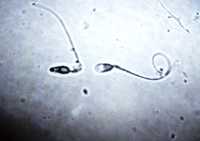MedicalResearch.com Interview with:
Dr Simone Immler PhD
School of Biological Sciences
University of East Anglia
MedicalResearch.com: What is the background for this study?
Response: Sperm produced by one male vary substantially both in their genetic content as well as their swimming ability including speed and duration. In a previous study in the zebrafish, we showed that sperm swimming duration is at least partly determined by the underlying haploid genetic content carried by the different sperm within an ejaculate (alavioon et al. 2017 PNAS). If sperm with different swimming ability differ in their genetic content, we expect to see differences among the offspring sired by sperm that vary on their swimming ability.
In our new study, we tested how selection on sperm swimming duration affects offspring fitness. We performed in vitro fertilisation assays mimicking natural conditions in the externally fertilising zebrafish. We split the ejaculate of one male into two halves and in one half we added the sperm straight away to the eggs, allowing all motile sperm to have a go at fertilising an egg. In the second half, we activated the sperm but delayed the moment of fertilisation by 25 seconds and thus selected for the longer swimming sperm. In this treatment only sperm that were still swimming after this period of time (about 50%) were able to fertilise an egg.
We then reared the offspring to adulthood and measured number of offspring produced throughout life and measured lifespan. We found that sperm that were able to swim for longer sired offspring that not only produced more and healthier offspring but also lived for longer than their full siblings sired by sperm with reduced swimming ability. Our previous research (Alavioon et al. 2017 PNAS) suggests that these differences are caused at least partly by genetic differences among sperm. (more…)

